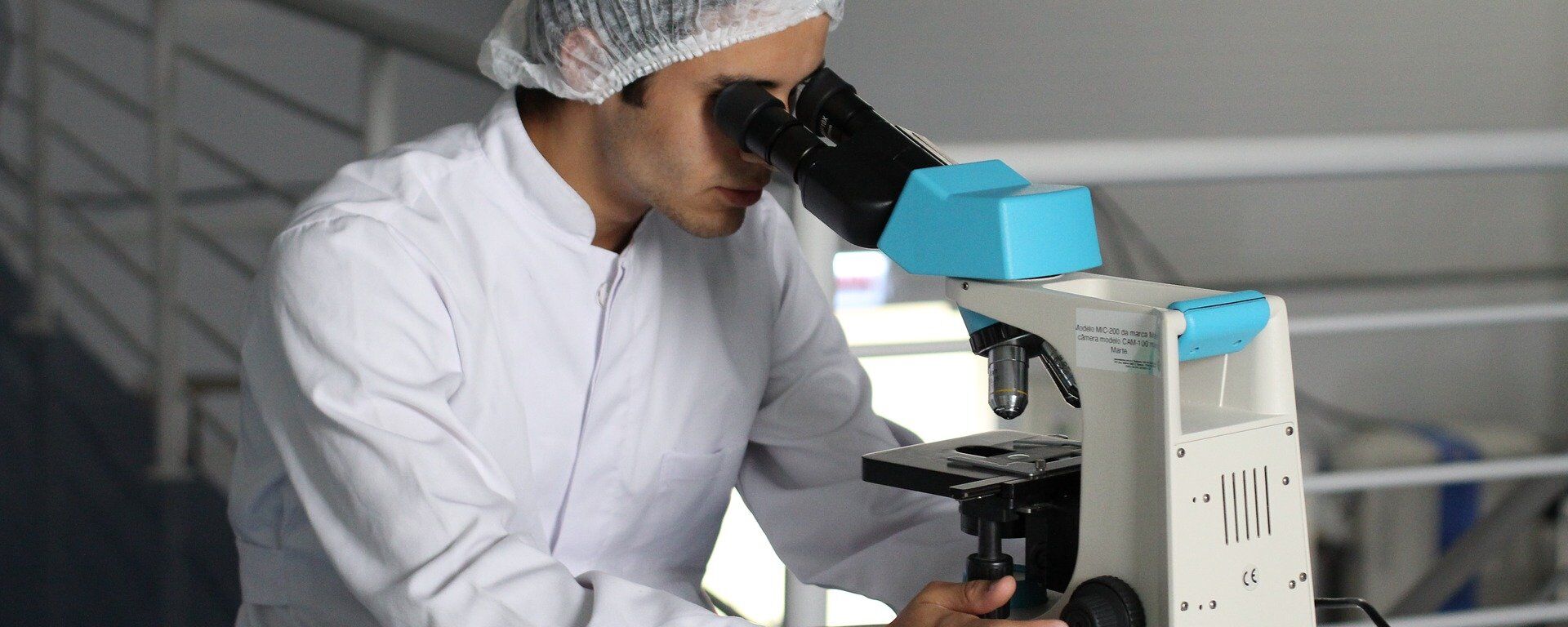https://sputnikglobe.com/20231209/fda-approves-cure-for-sickle-cell-disease-in-landmark-decision--1115491616.html
FDA Approves Cure for Sickle Cell Disease in Landmark Decision
FDA Approves Cure for Sickle Cell Disease in Landmark Decision
Sputnik International
The treatment will help those suffering from the most severe form of sickle cell disease (SCD), an illness that disproportionately affects people of African, Middle Eastern and Indian descent.
2023-12-09T03:32+0000
2023-12-09T03:32+0000
2023-12-09T03:32+0000
beyond politics
health
sickle cell
medicine
national institutes of health (nih)
crispr
science & tech
blood cells
us centers for disease control (cdc)
food and drug administration (fda)
https://cdn1.img.sputnikglobe.com/img/07e7/0c/09/1115491461_0:104:2000:1229_1920x0_80_0_0_5a743feefb6317bf3c23ddb41b80da05.jpg
On Friday the Food and Drug Administration (FDA) approved the first gene-editing treatment for human illness in a landmark decision. The treatment will help those suffering from the most severe form of sickle cell disease (SCD), an illness that disproportionately affects people of African, Middle Eastern and Indian descent."Gene therapy holds the promise of delivering more targeted and effective treatments, especially for individuals with rare diseases where the current treatment options are limited."The treatment, called Casgevy, comes from the Boston-based companies Vertex Pharmaceuticals and CRISPR Therapeutics. CRISPR (which stands for clustered regularly interspaced short palindromic repeats) is a form of technology that allows research scientists to selectively modify the DNA of living organisms, according to the National Institutes of Health (NIH). CRISPR won its inventors the Nobel Prize in chemistry in 2020.In treating SCD, doctors remove cells from a patient’s bone marrow, edit a gene with CRISPR technology, and then infuse billions of the modified cells back into the patient. Those edited cells then produce fetal hemoglobin, which restores the normal function of red blood cells. Casgevy, which is intended to be a one-time treatment, removes the need for a marrow donor.Sickle cell disease can cause life-threatening health problems that include: painful swelling, severe anemia, acute chest syndrome, and strokes, according to NIH. Unpredictable attacks of pain are also common and the disease can cause damage to vital organs. But after tests were completed, 29 subjects said the treatment had resolved their pain crises for at least 18 months.While the treatment is being hailed as a groundbreaking effort in treating SCD, it comes with a hefty price tag; costing $2.2 million per patient for its wholesale price. In addition to that, many hospitals are not well equipped to administer the treatment, and many patients will find the treatment to be physically and logistically challenging. And although it is technically a one-time treatment, it can actually take months of steps before a patient is able to get their modified stem cells.The NIH, as well as a center at Berkeley, are attempting to make gene-editing treatments easier to administer as well as more affordable. The companies that have created the treatments are also reportedly working with insurers in order to cover the cost of the procedure.Sufficient research must also be done to spot the “off-target” effects of the treatment which is what occurs when the gene-editing tool accidentally makes cuts to other stretches of DNA. But it may take time before experts are aware of the treatment’s long-term effects, as the trial has only been running for two years. The companies are planning to keep track of all the treated patients for 15 years.
https://sputnikglobe.com/20231011/have-scientists-uncovered-the-secret-to-living-beyond-100-1114101246.html
https://sputnikglobe.com/20231019/scientists-develop-hedge-hyssop-extract-for-advanced-cancer-treatment-1114322155.html
Sputnik International
feedback@sputniknews.com
+74956456601
MIA „Rosiya Segodnya“
2023
Mary Manley
https://cdn1.img.sputnikglobe.com/img/07e6/01/0b/1092187887_0:0:2048:2049_100x100_80_0_0_0c2cc4c84f89aff034cc55bb01fb6697.jpg
Mary Manley
https://cdn1.img.sputnikglobe.com/img/07e6/01/0b/1092187887_0:0:2048:2049_100x100_80_0_0_0c2cc4c84f89aff034cc55bb01fb6697.jpg
News
en_EN
Sputnik International
feedback@sputniknews.com
+74956456601
MIA „Rosiya Segodnya“
Sputnik International
feedback@sputniknews.com
+74956456601
MIA „Rosiya Segodnya“
Mary Manley
https://cdn1.img.sputnikglobe.com/img/07e6/01/0b/1092187887_0:0:2048:2049_100x100_80_0_0_0c2cc4c84f89aff034cc55bb01fb6697.jpg
health, medicine, sickle cell disease, scd, food and drug administration, fda, medicine trial, science, technology
health, medicine, sickle cell disease, scd, food and drug administration, fda, medicine trial, science, technology
FDA Approves Cure for Sickle Cell Disease in Landmark Decision
Sickle cell disease is a group of inherited red blood cell disorders, according to the CDC. Sickle cells - which are crescent-shaped instead of disk-shaped - die early on, and can cause a constant shortage of red blood cells. Symptoms for patients can range from mild to severe.
On Friday the Food and Drug Administration (FDA) approved the first gene-editing treatment for human illness in a landmark decision. The treatment will help those suffering from the most severe form of sickle cell disease (SCD), an illness that disproportionately affects people of African, Middle Eastern and Indian descent.
"Sickle cell disease is a rare, debilitating and life-threatening blood disorder with significant unmet need, and we are excited to advance the field especially for individuals whose lives have been severely disrupted by the disease by approving two cell-based gene therapies today," said Dr. Nicole Verdun, director of the Office of Therapeutic Products within the FDA's Center for Biologics Evaluation and Research.
"Gene therapy holds the promise of delivering more targeted and effective treatments, especially for individuals with rare diseases where the current treatment options are limited."
The treatment, called Casgevy, comes from the Boston-based companies Vertex Pharmaceuticals and CRISPR Therapeutics. CRISPR (which stands for clustered regularly interspaced short palindromic repeats) is a form of technology that allows research scientists to selectively modify the DNA of living organisms, according to the
National Institutes of Health (NIH). CRISPR won its inventors the Nobel Prize in chemistry in 2020.
In treating SCD, doctors remove cells from a patient’s bone marrow, edit a gene with CRISPR technology, and then infuse billions of the modified cells back into the patient. Those edited cells then produce fetal hemoglobin, which restores the normal function of red blood cells. Casgevy, which is intended to be a one-time treatment, removes the need for a marrow donor.
“I think this is a pivotal moment in the field,” said Dr. Alexis Thompson, chief of the division of hematology at Children’s Hospital of Philadelphia, who has previously consulted for Vertex. “It’s been really remarkable how quickly we went from the actual discovery of CRISPR, the awarding of a Nobel Prize, and now actually seeing it being an approved product.”

11 October 2023, 15:23 GMT
Sickle cell disease can cause life-threatening health problems that include: painful swelling, severe anemia, acute chest syndrome, and strokes, according to
NIH. Unpredictable attacks of pain are also common and the disease can cause damage to vital organs. But after tests were completed, 29 subjects said the treatment had resolved their pain crises for at least 18 months.
While the treatment is being hailed as a groundbreaking effort in treating SCD, it comes with a hefty price tag; costing $2.2 million per patient for its wholesale price. In addition to that, many hospitals are not well equipped to administer the treatment, and many patients will find the treatment to be physically and logistically challenging. And although it is technically a one-time treatment, it can actually take months of steps before a patient is able to get their modified stem cells.
“We really have to make sure that it is accessible,” said
Dr. Rabi Hanna, a pediatric hematologist-oncologist at the Cleveland Clinic who has previously served on the advisory board for Vertex. “This could be an equalizer for people with sickle cell because many patients cannot pursue career options [due to the illness].”

19 October 2023, 13:26 GMT
The NIH, as well as a center at Berkeley, are attempting to make gene-editing treatments easier to administer as well as more affordable. The companies that have created the treatments are also reportedly working with insurers in order to cover the cost of the procedure.
Sufficient research must also be done to spot the “off-target” effects of the treatment which is what occurs when the gene-editing tool accidentally makes cuts to other stretches of DNA. But it may take time before experts are aware of the treatment’s long-term effects, as the trial has only been running for two years. The companies are planning to keep track of all the treated patients for 15 years.







